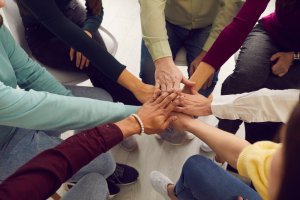Online Support Groups vs. In-Person Meetings
As the world become more connected through the Internet, online support groups are revolutionizing the addiction treatment space. Especially in light of the COVID-19 Pandemic, online support groups have become a vital part of telehealth and addiction treatment. For those in recovery, online support groups may be one of the few ways to maintain connection during the pandemic. The reason for the recent popularity of these groups is clear. There is a plethora of online support groups that offer people in recovery the opportunity to reach out and connect with others who are similarly seeking stability in their lives without drugs and alcohol.
But are these online support groups effective at helping people become or stay sober? Will they eclipse traditional in-person treatment? Or will online support group eventually be relegated to a supporting role in addiction treatment and recovery?
Are Online Support Groups Effective?
There are undoubtedly many benefits to online support groups. For example, you may be able to connect with others 24 hours a day. Traditional in-person meetings are usually held on schedules. While they can put you in contact with people who can help in a time of crisis, face-to-face meetings may not be able to provide on-demand support. Due to the informal scheduling, online support groups have greater flexibility in connecting with people during times of crisis.
Online support groups also tend to be free, which is important for many low-income individuals in recovery. They can also help connect people without direct contact. While this may be considered a drawback under normal circumstances, maintaining social distancing while still getting addiction recovery support is an incredible asset during a global pandemic.
While all these benefits of online support groups are great, there are also some weaknesses that may give in-person meetings the edge.
Why Are In-Person Meetings Effective?
Researchers reported at the American Psychological Association annual meeting that face-to-face meetings are more effective than online meetings. Why? Honesty, according to HealthDay. Participants in the study stated that they were more inclined to be honest when sharing with people at in-person meetings.
Many people who regularly abuse drugs and alcohol or who are living in addiction struggle with honesty. Lying can make it easier to maintain their addiction, avoid arguments and consequences associated with use of their drug of choice, and avoid facing the changes that occur due to substance abuse. It can take some time to learn how to avoid the impulse to lie — even in situations where lying wouldn’t improve the situation and the truth is perfectly acceptable.
Honesty is a skill that is often learned during the treatment and recovery process. According to the study, honesty is effectively learned via in-person group meetings rather than in online support groups. Increased honesty may be part of the reason why study participants who engaged in more face-to-face support groups were more likely to stay sober in relation to those who more frequently engaged in web-based support groups.
The Role of Social Media in Recovery
Social media and networking sites have completely changed the landscape of communication and relationships in the last couple of decades. Use of sites like Facebook, Twitter, Instagram, and Snapchat have the potential to augment positive social interactions, but depending upon them entirely for healthy relationships is not advised or even possible.
Donald Grant of Fielding Graduate University in Santa Barbara, California, is a study author. In a news release, he said: “One of the most hotly debated media issues today is whether our rapidly increasing use of social networking might be supplanting face-to-face-interactions and, if so, what the social consequences might prove for us as a culture.â€
Given the long history of availability of 12-Step meetings like Alcoholics Anonymous and other in-person support group meetings and how relatively recently people in recovery have had access to online recovery options, the long-term results of online services are as yet unknown.
A Combination of Resources for Recovery
People who leave addiction rehab are encouraged to focus on being active in their recovery. This often means taking part in a range of different outpatient addiction treatment services. Using a variety of options, including online support groups, can offer a range of benefits. These benefits may include:
- Helping to maintain interest in recovery with different services ranging from traditional to holistic.
- Increasing individuals’ support networks as they explore different treatment options and meet more people.
- Decreasing the amount of “down time”in early recovery that can contribute to an increased risk for relapse.
- Increasing the number of coping skills available as individuals navigate how to create a new life without drugs and alcohol.
Personalized Treatment Plan in Recovery
After the initial phase of intensive treatment, individuals can create their own unique combination of treatment services. These services may be involve a combination of in-person and online support groups. These services should appeal to one’s interests and treatment goals for recovery. Some options include:
- Seeing a cognitive behavioral therapist or other personal therapist.
- Continuing to manage any co-occurring mental health symptoms with the recommended therapeutic and pharmacological treatment resources.

- Working with a life coach.
- Using holistic therapies like yoga, meditation, acupuncture, and others.
- Taking part in alternative therapies like nutritional therapy, expressive therapies (e.g., art therapy, dance therapy, and sports and adventure therapies).
- Attending 12-Step meetings or other group meeting sessions.
- Taking part in educational workshops, support groups, or classes specific to areas of need in the person’s life. (e.g., parenting classes, chronic medical disorder support groups, legal aid and assistance, job skills classes, etc.).
How Will Online Support Groups Boost Your Recovery?
If you have completed a drug rehab program or are about to transition from a treatment program into independent living in sobriety, it’s important to have an actionable plan in place that will guide you through the first few months of recovery. Relearning skills like honesty and developing a support network can be challenging. Luckily, it’s not a process you’ll have to do alone. There are countless recovery groups, both online and in-person, that can help you through early recovery.

